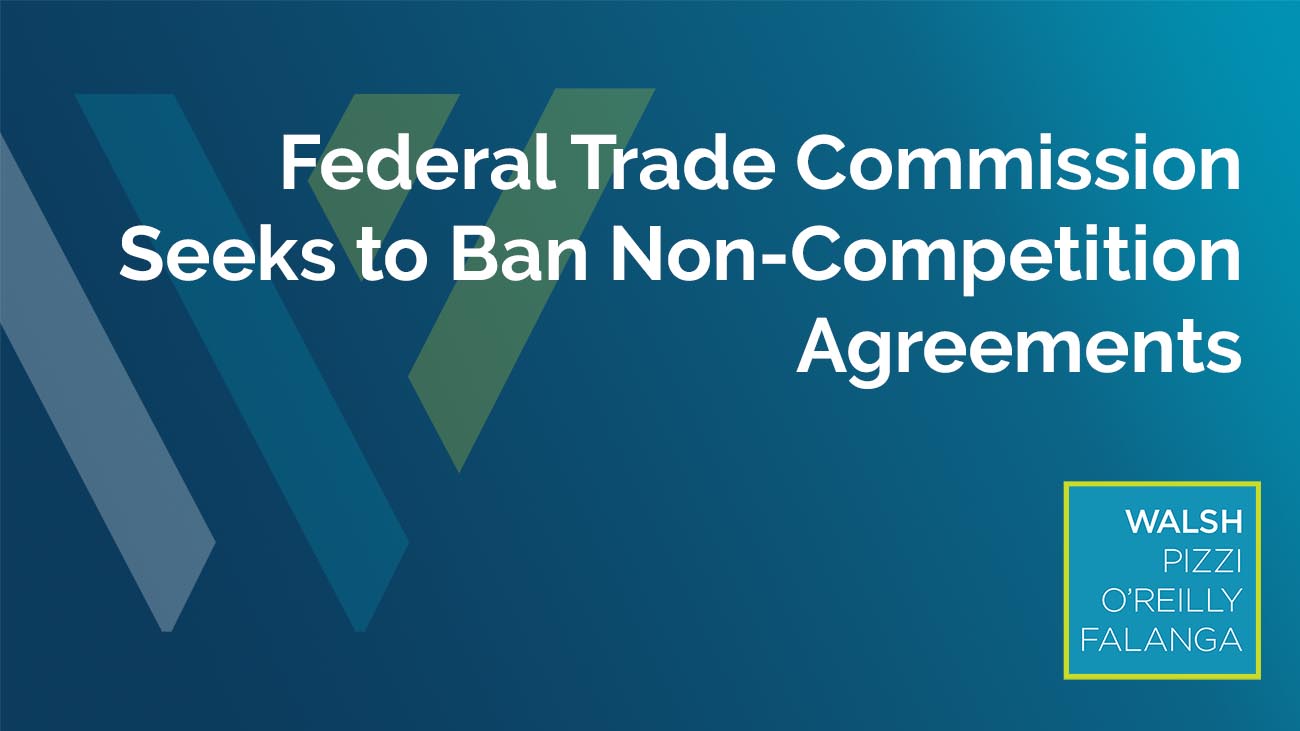
Federal Trade Commission Seeks to Ban Non-Competition Agreements
On April 23, 2024, the Federal Trade Commission (“FTC”) issued a final rule that would ban nearly all non-competition agreements in the United States. While states have been actively regulating non-competes in recent years, this rule marks the first time that a federal standard will apply on a national level. This rule is to go into effect on September 4, 2024.
Key Provisions
The rule is broad and prohibits traditional non-competes – those that prevent workers from going to work for competitors. The rule redefines a “non-compete clause” as a term or condition of employment that prohibits a worker from, penalizes a worker for, or functions to prevent a worker from 1) seeking or accepting work in the U.S. with a different business where such work would begin after the conclusion of employment, or 2) operating a business in the U.S. after the conclusion of employment. Once the rule goes into effect, it will supersede all contrary state laws.
The rule requires employers to give notice that existing non-competes are no longer enforceable. Model notice language is included in the Rule and can be delivered by email or text message, or by delivering a paper notice by hand or mail. The notices must be sent before the effective date of the rule.
Who is Bound By This Rule?
Most employers will be subject to the rule when it goes into effect. Violations of the FTC Act may result in fines, penalties, and other injunctive relief. However, certain entities are exempt from the FTC’s jurisdiction under the FTC Act. These entities generally include certain financial institutions including banks, credit unions, savings and loans, some non-profit organizations, and air carriers. For purposes of the rule, “worker” is broadly defined as any natural person who worked or previously worked for another person. The worker may be an employee, independent contractor, intern, volunteer, apprentice, sole proprietor, minority owner, or any other natural person who provides services.
Categories Not Covered by the Rule (Not Banned)
- Senior Executives: This rule will allow existing non-competes with senior executives to remain but will ban new non-competes with senior executives. The rule defines “senior executive” as a worker earning more than $151,164 who is in a “policy-making position.” A “policy-making position” includes a firm’s president, chief executive officer or the equivalent, any other officer with “policy-making authority,” and any other natural person with “policy-making authority” similar to that of an officer. “Policy-making authority” entails the “final authority to make policy decisions that control significant aspects of a business entity or common enterprise” but does not include “authority limited to advising or exerting influence over such policy decisions or having final authority to make policy decisions for only a subsidiary of or affiliate of a common enterprise.”
- Bona Fide Sale of a Business: There is a narrow exception allowing non-competes in certain “sale-of-business” agreements. This exception includes bona fide sales of a business, of a person’s ownership interest in a business, or of all or substantially all of a business’s operating assets.
- Prior Causes of Action: Causes of action that accrue before the rule’s effective date on September 4, 2024 are permitted to proceed.
The Latest Legal Challenges
On July 3, 2024, the Northern District of Texas, in Ryan LLC v. Federal Trade Commission, granted the plaintiff’s motion for a stay of the effective date and preliminary injunction of the FTC non-compete rule as applied to the Ryan LLC plaintiffs. While this preliminary injunction technically only applies to the plaintiffs and plaintiff-intervenors in the Ryan LLC case, analysts expect final injunction after adjudication on the merits to be nationwide, meaning that it would bar the FTC from enforcing the rule. In its decision and order, the court set forth that it expects to grant a final injunction after adjudicating the merits, which the court indicated it intends to conclude by August 30, 2024.
Ryan LLC is only one of several challenges to the rule. Additional challenges are pending in different courts, which may reach a resolution and other conclusions before Ryan LLC. This means another court may grant a nationwide preliminary injunction.
What Should Employers Do?
- Carefully follow whether the rule is enjoined and stay on top of the deadline for compliance if the rule remains.
- Conduct an audit of their existing agreements, analyze the potential impact of the new rule on the agreements, and weigh the costs and benefits of not revising agreements versus revising them before making any business decisions.
- Prepare a notice should the rule become effective by compiling a list of impacted current and former employees with relevant contact information.
- Consider alternatives to noncompete clauses. Employers should strategize other interest-protection methods that would achieve the same goals with less risk involved. This may include a properly tailored customer nonsolicitation or a confidentiality provision, if permitted by other local, state, and federal laws.
- Consider retention strategies in light of the rule against non-competes to reduce the number of employees exiting the company without a non-compete agreement. Key retention strategies might include more employee flexibility, better work-life balance, work from home availability, competitive compensation, and other benefits.
- Determine whether any impacted employees qualify for the “senior executive” description. Further evaluate whether there are “senior executives” who should sign non-competes prior to the Rule’s effective date.
- DO NOT send notices right away; monitor the progress of the legal challenges.
For any questions on the new FTC ban or to discuss strategies for addressing the potential upcoming non-compete ban, please contact Walsh’s Labor & Employment law practice group.
This article was authored by Walsh Pizzi O’Reilly Falanga LLP Summer Associate and Fordham University School of Law J.D. Candidate, Alexandra Arleo.

